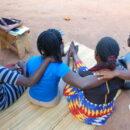Bona Malwal’s Truths – By Alex de Waal

 Bona Malwal, Sudan and South Sudan: From One to Two, London, Routledge, 2014.
Bona Malwal, Sudan and South Sudan: From One to Two, London, Routledge, 2014.
Bona Malwal’s political memoir is a complete resemblance of the man himself: argumentative and plain-spoken, partisan and selective, infuriating, fascinating, disorganized and wide-ranging, eloquent, essential and completely unique. Every South Sudanese and Sudanese should read it, all of it. Like Bona himself, his book, Sudan and South Sudan: From One to Two, has to be taken whole.
For fifty years, Bona has been a fervent South Sudanese nationalist who has (mostly) advocated self-determination and secession. Like Sudan’s modern history, this has been no easy or straight path. Bona was a minister in Jaafar Nimeiri’s government following the 1972 peace agreement, and thirty years later was an adviser to President Omar al Bashir. One of the most compelling parts of his book (pp. 121ff.) is the few pages he devotes to the July 1976 invasion by Sudanese exiles and (allegedly) Libyan mercenaries that reached Khartoum, and during three days of fighting, were on the brink of capturing the city. As Minister for Information, with control over the technology that allowed Radio Omdurman to continue broadcasting from Juba, even while its headquarters in the capital were in the hands of the rebels, Bona played a critical role in thwarting the take-over.
Through Bona’s career we can chart the evolution of the self-determination as it was applied to South Sudan. From the moment of the withdrawal of British imperial power in 1956, South Sudan was positioned at the hinge of two significantly divergent concepts of self-determination: the ethno-nationalist and the anti-colonial.
In 1994, in a historic move, for the first time in post-colonial African history, an African multilateral organization””the Inter-Governmental Authority on Development””adopted the principle of self-determination for South Sudan. To be precise, IGAD adopted two mutually inconsistent principles of self-determination. According to one (reflecting the Ethiopian position, enshrined in its Federal Constitution), all the peoples of Sudan were entitled to self-determination, in the event of a failure of democracy and governance of diversity. According to the other (the territorial anti-colonial principle), South Sudanese were entitled to self-determination because of their incomplete decolonization in 1956. By this definition, other marginalized peoples in Sudan, including those who fought as part of the SPLA, had no political right to self-determination.
Bona is in this latter camp, and he states his views trenchantly. He saw the SPLA’s struggle as primarily one for South Sudan, and the northern Sudanese forces””notably from the Nuba Mountains and Blue Nile””as latecomers who were hijacking this struggle. Bona describes his 1994 negotiations with the leaders of the Umma Party on the principle of self-determination, and graphically recounts his confrontation with the SPLA commanders from the Nuba and Blue Nile (pp. 56-62).
John Garang characteristically fudged the issue, keeping his true agenda””if indeed he had one””opaque. He agreed to sign a commitment to self-determination for South Sudan only, but also avowed a commitment to a “˜New Sudan’, saying that secessionists need follow him no further than Kosti, the first town in northern Sudan””but that he would proceed to Khartoum without them.
One of the strengths of Bona’s account is that he does not subscribe to the cloying hero-worship of John Garang””a man who was big and important enough not to need immunity from frank critique. To move forward, South Sudanese need to debunk the Garang myth, and Bona does his part.
Bona writes truths about Garang’s leadership that were widely whispered and acknowledged during the SPLA Commander-in-Chief’s life, but rarely articulated in public since his death. This is refreshing and overdue. Anyone familiar with the SPLA’s performance during the long years of war has been haunted by the sense that the war could have been concluded””by peace agreement or military victory””many years earlier, had there been a more capable leadership.
As Bona notes, “Garang’s real reasons for fighting the long civil war with the North were never clear because he never spelt them out” (p. 157). Moreover, he so centralized political management that decision-making was completely paralyzed apart from in his person: “in the SPLA world, there was no system. Whatever Colonel John Garang de Mabior decreed was the system. The SPLA has been running South Sudan since 2005 and still there is no system” (p. 161).
Every senior SPLA commander has a story of how Garang missed a military opportunity””from shunning the popular uprising in 1985 to withdrawing from Juba after overrunning the city in 1992 to blocking the oil exploration in 1998. Bona has a new twist to this long and sorry tale, with an account of how the U.S. Department of Defense was ready to supply the SPLA with $500 million of military equipment in 1994, but Garang passed up the chance (pp. 172-3).
Garang’s dreams sometimes lost touch with reality, or with humanity. Bona gives a compelling example that helps to explain why, for long periods of the war, the people of northern Bahr al Ghazal were left undefended in the face of the vicious onslaught of combined Arab militia and government battalions.
Garang “told me that if the people of the area allowed their numbers to be decimated, this was up to them.” (p. 176). He further proposed that several million of them relocate to a forested area close to the Central African Republic””a proposal made without taking into account the opinions of either the Dinka people who would need to be relocated (and abandon their cattle in the process) or the Fertit people who lived in the area, who were already engaged in a bitter armed conflict with the Dinka for control of Wau town.
The men whom Bona calls “Garang’s boys” have inherited this strain of visionary recklessness, for example shutting down South Sudan’s oil pipeline””Bona calls it an “incredible blunder” (p. 201) without an alternative plan.
Bona makes no secret of his admiration for and friendship with Salva Kiir, and describes the military salvage operation that Salva had to undertake when he was assigned to Bahr al Ghazal in the late 1990s. Finding the SPLA forces there in complete disarray, Salva reconstituted them, beginning with a youth militia group (Tit Weng) (pp. 160ff). Bona himself was closely associated with the challenging of monies to these forces through the monies provided by Christian anti-slavery groups (pp. 178 ff)””a mechanism he cleverly defends as an effective measure for building up a defence force to prevent raiding by the Arab militia.
As journalist, editor and politician, Bona Malwal has been a presence in Sudanese and South Sudanese political life for half a century. He cannot be ignored. Nor can this book.
Alex de Waal is Director of the World Peace Foundation.






Although I have not yet read the book of Bona Malwal, your preface is very compelling. I will try my very best to find and read his two books. As a South Sudanese, I thank you for reminding me to do so.
Regards
Joseph
A partisan memoir, reviewed by a partisan. I am not well read but from the little I’ve read, Alex De Waal has never written anything positive about John Garang. Most of his writing seems to be influenced so much by spending much of his time in Sudan in the North. You should both have spent a few years in the South during the war, unfortunately both you (Alex & Bona) were with the Arabs in Khartoum. Hard you done this your views would be more balanced. Mark you, I am not holding brief for Garang, but your views are too subjective to be credible.
chloroguine https://chloroquineorigin.com/# hydroxychlor 200 mg
cialis generic cialis alternative
buy cialis online https://cialiswithdapoxetine.com/